Related Research Articles
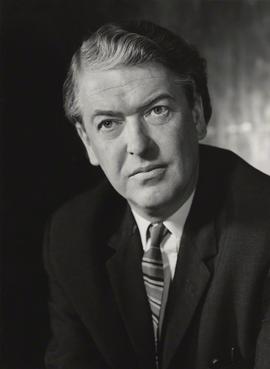
Sir Kingsley William Amis was an English novelist, poet, critic and teacher. He wrote more than 20 novels, six volumes of poetry, a memoir, short stories, radio and television scripts, and works of social and literary criticism. He is best known for satirical comedies such as Lucky Jim (1954), One Fat Englishman (1963), Ending Up (1974), Jake's Thing (1978) and The Old Devils (1986).
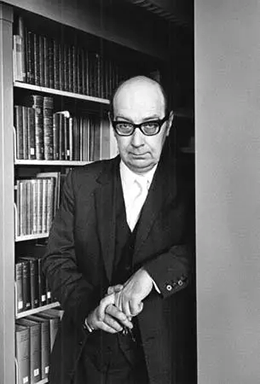
Philip Arthur Larkin was an English poet, novelist, and librarian. His first book of poetry, The North Ship, was published in 1945, followed by two novels, Jill (1946) and A Girl in Winter (1947). He came to prominence in 1955 with the publication of his second collection of poems, The Less Deceived, followed by The Whitsun Weddings (1964) and High Windows (1974). He contributed to The Daily Telegraph as its jazz critic from 1961 to 1971, with his articles gathered in All What Jazz: A Record Diary 1961–71 (1985), and edited The Oxford Book of Twentieth Century English Verse (1973). His many honours include the Queen's Gold Medal for Poetry. He was offered, but declined, the position of Poet Laureate in 1984, following the death of Sir John Betjeman.
The "angry young men" were a group of mostly working- and middle-class British playwrights and novelists who became prominent in the 1950s. The group's leading figures included John Osborne and Kingsley Amis; other popular figures included John Braine, Alan Sillitoe, and John Wain. The phrase was originally coined by the Royal Court Theatre's press officer in order to promote Osborne's 1956 play Look Back in Anger. It is thought to be derived from the autobiography of Leslie Paul, founder of the Woodcraft Folk, whose Angry Young Man was published in 1951.

This article focuses on poetry from the United Kingdom written in the English language. The article does not cover poetry from other countries where the English language is spoken, including the Republic of Ireland after December 1922.
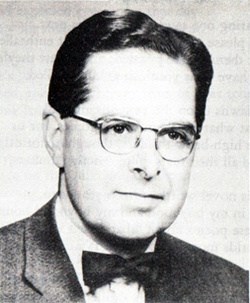
Donald Alfred Davie, FBA was an English Movement poet, and literary critic. His poems in general are philosophical and abstract, but often evoke various landscapes.

The Golden Treasury of English Songs and Lyrics is a popular anthology of English poetry, originally selected for publication by Francis Turner Palgrave in 1861. It was considerably revised, with input from Tennyson, about three decades later. Palgrave excluded all poems by poets then still alive.
John Barrington Wain CBE was an English poet, novelist, and critic, associated with the literary group known as "The Movement". He worked for most of his life as a freelance journalist and author, writing and reviewing for newspapers and the radio.
Thomson William "Thom" Gunn was an English poet who was praised for his early verses in England, where he was associated with The Movement, and his later poetry in America, where he adopted a looser, free-verse style. Gunn wrote about his experience moving to San Francisco from England. He received numerous literary honors, and his best poems are reputed to possess a restrained elegance of philosophy.

The Oxford Book of Contemporary Verse, edited by D. J. Enright, is a poetry anthology from 1980, published by Oxford University Press. It might be considered one of the "last words" from a founder-member of The Movement, with its comments in the Introduction still in an anti-romantic vein, and that "the editor remains unpersuaded that wit is necessarily evasive in some shabby way or emotionally lowering". It was reissued in 1995 under the title Oxford Book of Verse 1945–1980 (ISBN 0-19-283188-7).
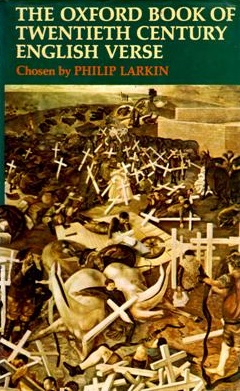
The Oxford Book of Twentieth Century English Verse is a poetry anthology edited by Philip Larkin. It was published in 1973 by Oxford University Press with ISBN 0-19-812137-7. Larkin writes in the short preface that the selection is wide rather than deep; and also notes that for the post-1914 period it is more a collection of poems, than of poets. The remit was limited by him to poets with a period of residence in the British Isles. Larkin's generous selection of Thomas Hardy's poems has been noted for its influence on Hardy's later reputation. On the other hand, he was criticized, notably by Donald Davie, for his inclusion of "pop" poets such as Brian Patten. The volume contains works by 207 poets.
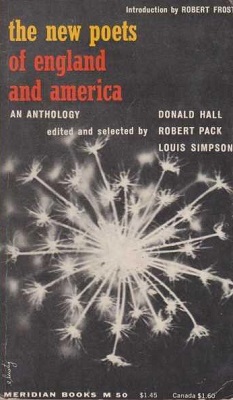
New Poets of England and America was a poetry anthology edited by Donald Hall, Robert Pack and Louis Simpson, and published in 1957. In the post-war story about relations between American and British poetry, it represents the moment of closest rapprochement, actual or intended. The introduction was written by Robert Frost. The inclusion of a number of British Movement poets, as well as others, implies some kind of search for matching figures amongst the Americans. Poets had to be under forty years old to be included.
Penguin Modern Poets was a series of 27 poetry books published by Penguin Books in the 1960s and 1970s, each containing work by three contemporary poets. The series was begun in 1962 and published an average of two volumes per year throughout the 1960s. Each volume was stated to be "an attempt to introduce contemporary poetry to the general reader". The series added up to a substantial survey of English-language poetry of the time.
British Poetry since 1945 is a poetry anthology edited by Edward Lucie-Smith, published in 1970 by Penguin Books, with a second and last edition in 1985. The anthology is a careful attempt to take account of the whole span of post-war British poetry, including poets from The Group, a London-centred workshop that Lucie-Smith himself had once been chairman of, following the departure of founder Philip Hobsbaum.

George Sutherland Fraser was a Scottish poet, literary critic and academic.
The Penguin poetry anthologies, published by Penguin Books, have at times played the role of a "third force" in British poetry, less literary than those from Faber and Faber, and less academic than those from Oxford University Press..
The Group was an informal group of poets who met in London from the mid-1950s to the mid-1960s. As a poetic movement in Great Britain it is often seen as being the successor to The Movement.
Nationality words link to articles with information on the nation's poetry or literature.
The Fantasy Press was an English publisher of poetry between 1951 and 1962, allied to the Oxford University Poetry Society and superintended by the painter and illustrator Oscar Mellor. As well as publishing a regular series of pamphlets by undergraduate and graduate poets between 1952 and 1957, it also brought out longer collections by some, as well as anthologies of university poetry containing their work.

Jerry W. Bradley is an American poet and university professor.
References
- 1 2 3 4 Marcus, Laura; Nicholls, Peter (2004). The Cambridge History of Twentieth-Century English Literature. Cambridge University Press. pp. 399–. ISBN 978-0-521-82077-6.
- 1 2 3 Lodge, David (1 January 1981). Working with Structuralism: Essays and Reviews on Nineteenth- and Twentieth-Century Literature. Routledge. p. 9. ISBN 978-0-7100-0658-5.
Dylan Thomas was made to stand for everything they detested: verbal obscurity, metaphysical pretentiousness, and romantic rhapsodizing
- ↑ Angry Young Men
Bibliography
- Enright, D. J. (editor), Poets of the 1950s: An Anthology of New English Verse, Tokyo, Kenkyusha, 1955
- Morrison, Blake, The Movement, Oxford University Press, 1980